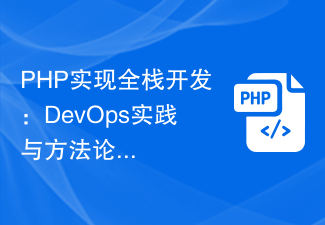In a cloud-native environment, Java frameworks support DevOps practices, including: Continuous Integration: Automated build, test, and integration processes. Continuous deployment: Simplify the deployment of code changes. Infrastructure as Code: Use code to define and manage cloud resources. Automated testing: Ensure application correctness and reliability.

DevOps application of Java framework in cloud native environment
Introduction
In a cloud-native environment, DevOps practices are critical to building, deploying, and managing scalable, secure, and highly available applications. Java frameworks are widely used in cloud native scenarios, providing strong support for building complex systems and implementing DevOps principles.
Java Framework Brief Description
Commonly used Java frameworks include Spring Boot, Micronaut and Quarkus. They provide key features such as:
- Rapid Application Development
- Lightweight Container Integration
- Cloud Services and Infrastructure Integration
Java framework in DevOps practice
In DevOps practice, Java framework plays a vital role in the following aspects:
- Continuous Integration (CI): By automating the build, test, and integration processes, Java frameworks improve development efficiency and code quality.
- Continuous Deployment (CD): Java framework that simplifies the process of deploying code changes to production, enabling fast and reliable delivery.
- Infrastructure as Code (IaC): A Java framework that enables the use of code to define and manage cloud resources, making infrastructure more repeatable and consistent.
- Automated Testing: The Java framework provides a wide range of testing capabilities that help ensure the correctness and reliability of the application.
Practical case
Spring Boot + AWS Lambda
Consider using Spring Boot to develop an AWS Lambda-based Serverless applications. Spring Boot provides out-of-the-box AWS Lambda support, simplifying serverless deployment.
import com.amazonaws.services.lambda.runtime.Context;
import com.amazonaws.services.lambda.runtime.RequestHandler;
public class MyLambdaHandler implements RequestHandler<String, String> {
@Override
public String handleRequest(String input, Context context) {
return "Hello, " + input + "!";
}
}Micronaut + Kubernetes
Build microservices using Micronaut and deploy on Kubernetes. Micronaut has built-in Kubernetes integration, simplifying containerization and orchestration.
@Client(value = "MyService")
public interface MyClient {
@Get
Single<String> get();
}apiVersion: apps/v1
kind: Deployment
metadata:
name: my-service
spec:
selector:
matchLabels:
app: my-service
template:
metadata:
labels:
app: my-service
spec:
containers:
- name: my-service
image: my-service:latest
ports:
- containerPort: 8080Conclusion
Java frameworks play a vital role in DevOps in cloud native environments, providing automation, scalability, repeatability and Efficiency. By choosing the right framework and implementing best practices, developers can significantly improve the efficiency and reliability of their development and deployment processes.
The above is the detailed content of DevOps application of Java framework in cloud native environment. For more information, please follow other related articles on the PHP Chinese website!
 PHP CI/CD 在 DevOps 项目中的作用May 08, 2024 pm 09:09 PM
PHP CI/CD 在 DevOps 项目中的作用May 08, 2024 pm 09:09 PMPHPCI/CD是DevOps项目中的一种关键实践,它可实现自动化构建、测试和部署流程,从而提高开发效率和软件质量。典型的PHPCI/CD管道包含以下阶段:1)持续集成:每当代码发生更改时,都会自动构建和测试代码。2)持续部署:通过自动部署经过测试和集成的代码到生产环境,从而加快交付速度。通过实施PHPCI/CD管道,可以提高开发效率,改进软件质量,缩短上市时间并提高可靠性。
 DevOps在增强软件开发生命周期中的作用Feb 04, 2024 pm 05:56 PM
DevOps在增强软件开发生命周期中的作用Feb 04, 2024 pm 05:56 PMDevOps是一种方法论,结合了无缝集成软件开发和IT 运营用于简化工作流程,DevOps强调改善沟通、促进团队合作和团结软件交付团队,是响应速度更快、同步性更强的开发过程的触发器,帮助企业实现更好的整体性能、更高的客户满意度、更快的上市时间和成本效益。
 PHP框架与DevOps的集成:自动化和敏捷性的未来Jun 05, 2024 pm 09:18 PM
PHP框架与DevOps的集成:自动化和敏捷性的未来Jun 05, 2024 pm 09:18 PM将PHP框架与DevOps集成可提高效率和敏捷性:自动化繁琐任务,释放人员精力专注于战略任务缩短发布周期,加快上市时间提高代码质量,减少错误增强跨职能团队协作,打破开发和运营孤岛
 PHP实现全栈开发:DevOps实践与方法论Jun 18, 2023 am 11:52 AM
PHP实现全栈开发:DevOps实践与方法论Jun 18, 2023 am 11:52 AM在当今互联网行业中,全栈开发成为了一个趋势。PHP作为一门具有丰富生态系统的编程语言,已然成为了全栈开发的一个主流选择。然而,全栈开发不仅仅止于编写代码的能力,更需要具备DevOps方面的知识与实践能力。本文将从DevOps实践与方法论的角度探讨如何通过PHP实现全栈开发。一、什么是全栈开发全栈开发是指开发人员能够开发从前端到后端甚至是服务器架构的各个层面的
 PHP Jenkins 与 Docker:强大组合,实现持续集成Mar 09, 2024 am 10:04 AM
PHP Jenkins 与 Docker:强大组合,实现持续集成Mar 09, 2024 am 10:04 AM在当今快速发展的软件开发环境中,持续集成(CI)已成为现代应用程序开发中不可或缺的一部分。PHPjenkins与Docker的强大组合,为php开发人员提供了简化开发流程、提高质量和效率的理想解决方案。使用PHPJenkins进行CIJenkins是一个流行的开源CI服务器,允许开发人员自动化构建、测试和部署过程。通过将PHPJenkins集成到开发工作流程中,PHP开发人员可以:自动化构建和测试过程快速检测和修复错误轻松跟踪项目进度提高代码质量和稳定性使用Docker进行容器化Docker是一
 如何在PHP编程中使用DevOps?Jun 12, 2023 am 11:16 AM
如何在PHP编程中使用DevOps?Jun 12, 2023 am 11:16 AM随着DevOps理念的普及,越来越多的开发者开始尝试将它应用于自己的项目开发中。在PHP编程中使用DevOps可以让我们更加高效地进行系统开发、运维和交付。在本文中,我们将探讨如何在PHP编程中使用DevOps。自动化构建和部署DevOps的核心理念是将开发、测试和部署环节无缝衔接起来,使整个开发流程更加流畅。在PHP编程中,我们可以使用自动化构建和部署工具
 Kubernetes 与 Java 携手共进:超越传统,拥抱创新Feb 29, 2024 pm 01:31 PM
Kubernetes 与 Java 携手共进:超越传统,拥抱创新Feb 29, 2024 pm 01:31 PMKubernetes与Java的强强联手kubernetes是一个开放源代码容器编排平台,用于自动化容器管理、网络和存储。它使开发人员能够管理复杂且分布式的应用程序,从而提升应用程序的可用性、可扩展性和管理效率。Java是一种流行的编程语言,广泛用于开发各种企业级应用程序。其强类型的特性、稳健性和跨平台能力使Java成为Kubernetes容器中部署应用程序的理想选择。好处:1.容器化带来的好处:应用程序隔离和便携性:Kubernetes容器将Java应用程序与基础设施隔离,从而提高应用程序的可
 Java DevOps 实战:常见问题解答和最佳流程May 08, 2024 pm 10:03 PM
Java DevOps 实战:常见问题解答和最佳流程May 08, 2024 pm 10:03 PMJavaDevOps实践中常见问题解答:使用Git或Mercurial管理代码和基础设施变更。使用Maven或Gradle自动化构建,使用Jenkins或Puppet自动化部署。建立跨职能团队,定期沟通协作。使用JUnit或Mockito持续测试,集成性能监控工具。实战示例:使用Jenkins自动化构建和部署JavaWeb应用程序。


Hot AI Tools

Undresser.AI Undress
AI-powered app for creating realistic nude photos

AI Clothes Remover
Online AI tool for removing clothes from photos.

Undress AI Tool
Undress images for free

Clothoff.io
AI clothes remover

AI Hentai Generator
Generate AI Hentai for free.

Hot Article

Hot Tools

Atom editor mac version download
The most popular open source editor

MantisBT
Mantis is an easy-to-deploy web-based defect tracking tool designed to aid in product defect tracking. It requires PHP, MySQL and a web server. Check out our demo and hosting services.

Dreamweaver Mac version
Visual web development tools

PhpStorm Mac version
The latest (2018.2.1) professional PHP integrated development tool

Safe Exam Browser
Safe Exam Browser is a secure browser environment for taking online exams securely. This software turns any computer into a secure workstation. It controls access to any utility and prevents students from using unauthorized resources.






